All we should do is rock-and-roll
On a rainy Wednesday morning Bostonian people were rushing to the train station to arrive on time for their classes and work shifts. Students fixing their umbrellas, parents having a long-hour conversation while looking at their watch and sipping some hot tea – everyone was being late for something important to them, unlike other Bostonians who were more relaxed than others. They were waiting for the T to come to go to a cozy cafe near Harvard Square, get some latte and enjoy this weather from the windows while having conversations about their plans for tomorrow.
“Going to The Packie?” asked one girl in a Bostonian accent. The other replied “Absolutely! Let’s fuel this party with keggah(beer)”. But there was only one person quietly waiting for me in the Malden train station and holding his black cane and a phone. His name was Ian Perrault, an adventurer, a gourmand and a life lover.
Ian has been blind since birth, “but his blindness hasn’t slowed him down one bit”. Over the course of 38 years of his life he has been taking huge steps in educating abled people about how to treat people with disabilities or in other words “all the same gamers of a play called life”. When I arrived at the train station and approached him, he greeted and hugged me from the very first seconds. It was a moment of a genuine connection when I realized that I met not a person with a disability, but a person with his own baggage of experience.
Ian was born and raised in Brighton, a city located in the outskirts of Boston. He says that his inability to see did not put any boundaries to enjoy his life to the fullest. He ”rock-and-rolls” every single day while working as an ADA Specialist and Website Accessibility Consultant for a Bank. He is responsible for ensuring accessibility for blind and visually impaired users. He works from home, where he has the whole system of computers that helps him to do all the necessary tasks for his job. The rest of the day he likes to walk around Boston by using his adaptive technology which navigates him, informs about the weather, describes the colors of objects and many more. When we were in the train station deciding where to go, he shook his phone twice and there were several voices that informed him about something that I could hardly understand. They were the voices that Ian has been hearing since the day he learned how to use this adaptive technology.
When he was teenager, his mom made it possible for him to get enrolled in the oldest school for the blind named The Perkins School. Before being accepted, he spent 9 years of his life in a public school that catered neither facilities, nor a specifically tailored program for blind people. His teachers dared to force him to do tasks that he didn’t have basic skills for. It was one of the traumatizing experiences in his life as his surroundings were educated about what it meant to treat everyone equally, but they never knew how to instill that knowledge in their life and relationships with Ian.
The Perkins School laid a foundation for his entire life, career and connections that he made later on. The program at this school is directed towards academic learning, but what is most importantly is teaching how to use one’s body to its best capacity. Some of the subjects that he covered included learning a braille language, traveling safely and independently using a white cane, increasing a sense of space awareness and developing social skills for work. When we were on the way to his school, he pulled his cane and started sliding it through the steel fences. Each fence produced a different sound, which he could distinctly recognize. I asked him “What are you doing?” and he replied “Searching for the sound of home”. When we were very close to his school, the sound of fences was different. It had a unique vibration that is easy to differentiate from the rest of house fences that we passed. Ian exclaimed: “That’s it! This is the school”.
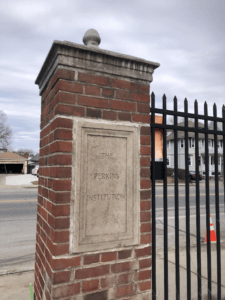
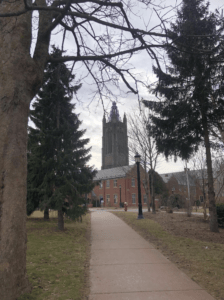
The road that leads to the main clock tower absorbed all the memories of the Perkins School alumni, who oftentimes visit their teachers, assistants and friends to bring those emotions back. “Lots of people that I bring here say that this building resembles the architecture of Hogwarts, I am a big fan of Harry Potter” said Ian.
Within a 10 minute walking distance from the Perkins School, there was a Greek restaurant, Demos, where Ian and his school fellows used to have lunch at. Ian insisted on having lunch in Demos since the last time he had been there was before the global pandemic, when all of his favorite spots were no longer available. On the way we were talking about the differences of northern and southern states and imitated Bostonian and Alabama accents. Ian has that old dad mannerism that could remind of some characters from sitcoms. I wondered who he might have a striking resemblance with.
We crossed the road and Ian asked me whether Starbucks was on the opposite side of the road to ensure that we were heading in the right direction. Then, after several minutes of walking he asked if I saw the Demos sign, I said “Yes, it is over there!” pointing to the restaurant that was just in front of us. Ian laughed and said “Yeah! I see it”. I was embarrassed that I had unconsciously used the word “see” in my dialogue with him. I put my other hand on his elbow and we could not help, but laughed hysterically. After one minute of silence, Ian said that he perceives such experiences as a compliment, because in this context people who accompany him do not bring the concept of blindness first, which he truly admires.
The doors of his memorable place have opened like an old album that we open to reminisce about good times. Ian stopped for a moment and made a circle to see if the place where they used to sit has been changed. His steps were confident, he knew where to go and sit. I silently followed to let him prolong this moment. A waiter brought two menus, but Ian asked to give it only to me. He knew the names of all meals by heart. Ian asked for a bottle of beer, his favorite classic gyro, side salad and a spinach pie and said referring to me and the waiter “You know what makes life beautiful? Beer, food and people that we know and that we haven’t met”. The waiter gave him a big warm smile that Ian could feel without any words. He was served a big platter of gyro that tasted all the same. It was a pre-pandemic taste of life, that was no better no worse.
10 years ago Ian found a way to connect with the whole world while still enjoying walking around Boston. He discovered an app called Couchsurfing which allows him to meet tourists and share his impressions of what it is like to live in this city. By 2023, he managed to meet with more than 150 Couchsurfers from around the world and tell about his exciting life full of adventures. Apart from that, he himself managed to use this application to travel across the states and some other countries such as Hong Kong, Canada, Chile, England and France. Ian constantly shares his travel adventures with his audience on the Perkins School blog.
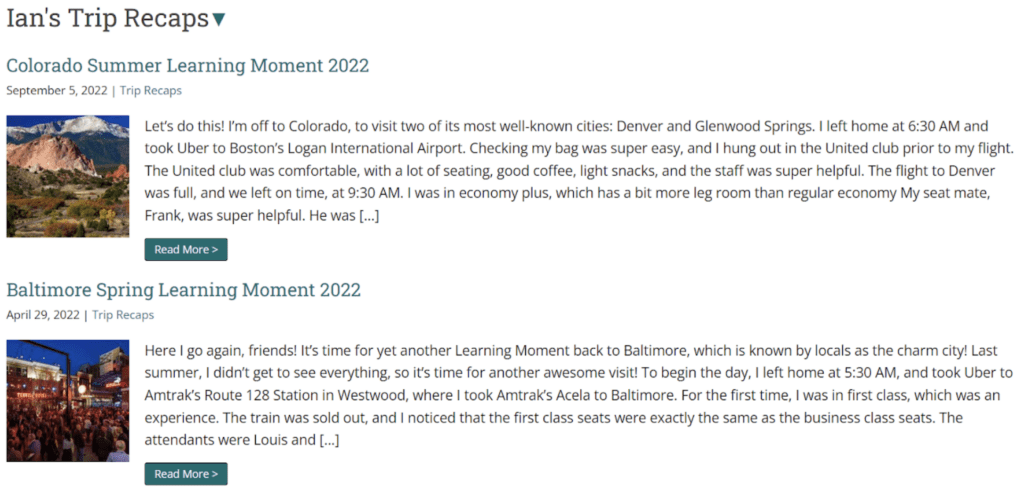
On his Couchsurfing account he explicitly encourages people to send him a request for a meeting if they want to learn more about the lives and perspectives of blind people. Moreover, on his page he says “the only stupid question is the one that unfortunately is not asked”. Educating non-disabled people and embracing the power of friendships seem as if it is his life mission and a perpetual driving force. Wherever he goes, he always makes friends. Whether it is on the train, in the mall, in the restroom, Ian mingles with complete strangers that end up meeting him in other corners of the world. Ian always makes sure to let people know that he is willing to hang out with them by posting additional announcements on Facebook Forums.
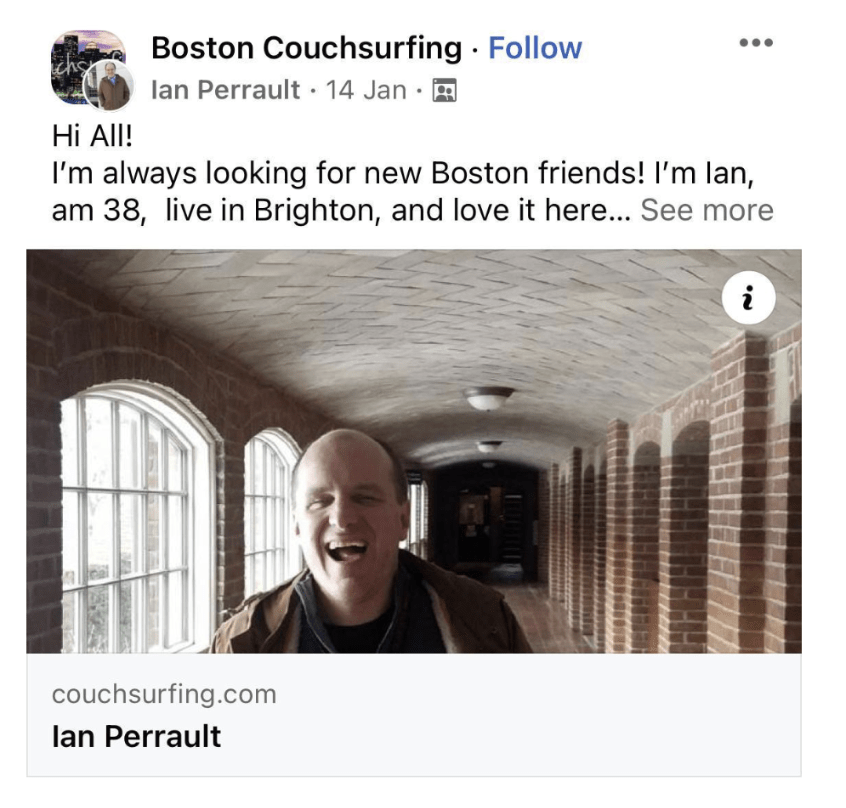
His recent trip was to Portland, where he headed to visit his old school friend, Terracy. They both were from different cohorts, but made sure to keep their connection alive until these days. From Boston to Portland, Ian was full of expectations to explore a new city that he was eager to tell about in his travel blog. Right from the airport, he hopped on the bus and easily found his hotel with the help of his adaptive technology. It seemed that he was not new to this city. It seemed that Portland had been his old good friend as well. Every brick aligned in a way so Ian could easily navigate around the city unlike his friend Terracy, who has been living here since his birth, but still found it difficult to use the on-ground transportation. When they met over a cup of coffee, Ian shared his own navigation techniques that made his friend’s life much easier. Ian was not born with this ability to navigate throughout the city. It is his skill that he has been constantly practicing. It was a pure process of trial and error, where he could bump into someone or something, get lost, get occasionally injured, but he continued to try it again and again. Besides, Ian collaborated with the MBTA, the Massachusetts Bay Transportation Authority, to develop more friendly facilities for people with disabilities. His ultimate goal is to spread this culture across the US.
Some Couchsurfing experiences of Ian are not as positive and enriching as the other ones. One day he received a message from a German woman named Kathy, who came to Boston for a week. She sent a request to Ian showing her enthusiasm to meet and spend a day with a blind person for the first time in her life. They met near her hotel, where she was not as warm as in her messages. Ian suggested going to Starbucks to grab some coffee and talk about life. Kathy kindly accepted his offer, but there was a certain hesitation in her voice that Ian could sense from the very beginning. Ian asked her if he could hold her elbow to walk safely. She gave her hand that shieverd and turned into ice once Ian touched her. They finally came to Starbucks, where there was no queue so Ian went first to order his go-to drink, Americano. Kathy stood behind him and said that she had to go to the restroom for a minute. She left, while Ian was waiting for his drink to be ready. “Your drink is ready, sir” said one of the Starbucks workers. He grabbed his drink and went back to his seat where he was waiting for Kathy for the next hour. He has never heard anything back from her. As Ian puts it, for her the idea of meeting a blind person was illusional. She was living in a bubble, where she had her perception of the blind constructed by movies and advertisements.
While reflecting on his experience, Ian sighed deeply and said “People believe everything that they see on TV. They abandon a space, where they have an opportunity to have their personal experience and draw their own conclusions. They believe in this “universal truth”, where people with disabilities have to inspire them. But they miss out on one important thing – human-to-human interaction.” Ian believes that the philosophy of life is very simple – you just have to be open-minded.
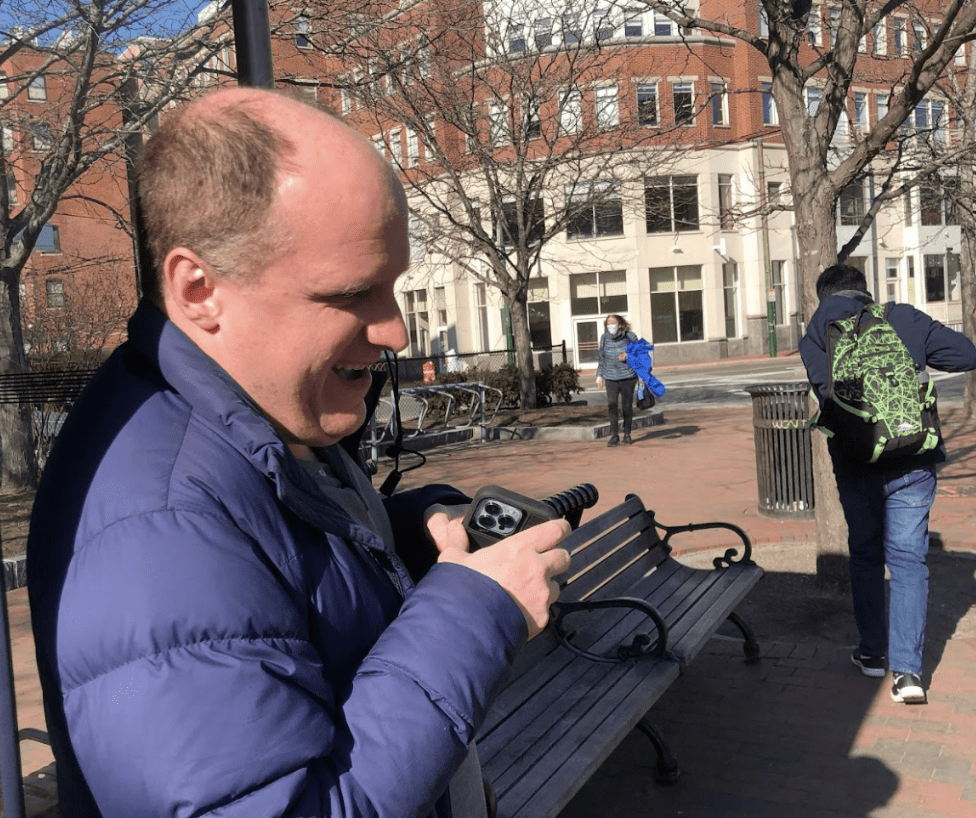
As we finished our trip, we headed to the station, where Ian waited for his bus to go to his QUEER karaoke party and enjoy the rest of the day with his friends singing songs of Beatles, QUEEN and Rolling Stones. The bus arrived within 5 minutes and he made a few steps towards it, then he looked back at me and said “All we should do is rock-and-roll”.
REFERENCES
Ian Perrault. (n.d.). Ian Perrault. Retrieved 8 November 2023, from https://www.couchsurfing.com/people/ian-perrault
Ian Perrault’s Blog Posts. (n.d.). Welcome to the Official Website of Ian Perrault. Retrieved 8 November 2023, from https://www.ianperrault.com/blog/